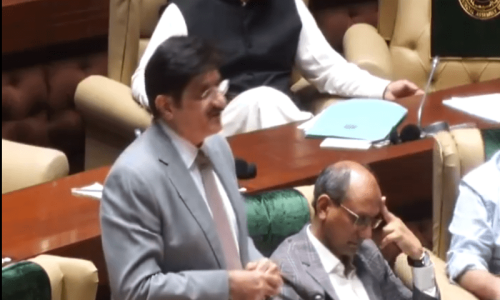 |
| —White Star |
KARACHI: Urdu translations of Vibhuti Narain Rai’s Hindi novels titled Tabadla and Ghar by Zeba Alvi were launched at the Arts Council Karachi on Thursday night.
Distinguished novelist Dr Hasan Manzar, who was the chief guest on the occasion, said although he met Mr Rai in person recently, he had already been introduced to him through his novel Shehr Mein Curfew. Meeting the Indian novelist made him realise that there was ‘nearness’ between them, because he came from Azam Garh and he (Manzar) had links to Gorakhpur and Partabgarh, he told book lovers who had come to the event in a reasonable number. On Tabadla he said it was an interesting book highlighting both the ‘physiology’ and ‘pathology’ of society. Since Mr Rai had also served as IG Police (apart from being a former vice-chancellor of the Mahatma Gandhi University) he raised the question whether he wrote his books while working in the police department or afterwards, and whether he faced any difficulties in that regard.
Mr Rai began his address by answering Dr Manzar’s question first. He said all of his books were published while he was performing his duties as a policeman. “I never received any punishment because thankfully our politicians don’t read,” he remarked. He said he had led two lives: one of a police officer and the other of a writer, but when he was with his police force he tried his best not to let his colleagues know that he had a penchant for writing. Similarly, he never mingled with writers in the capacity of a government servant, he said.
Mr Rai mentioned that he did face problems here and there but not on a large scale. For example, he said, once a chief minister posted him to a remote area, however, and luckily, there he found that the officer before him had set up a little library there which helped him (Rai) a great deal in reading books that he always wanted to read. Besides, he commented, it was generally believed that people who had a police background did not have creative potential; so he had to prove a point that it was a wrong notion. He said being a follower of Marxist philosophy also helped him acknowledge the good things in life, because adhering to Marxist ideals enabled him to perform his duties not as a Hindu or Muslim but as a human being. He informed the audience that his nonfiction book would soon be out, and it was his biggest writing challenge so far.
Prof Sahar Ansari lauded the translator Zeba Alvi’s effort claiming that reading the two books felt as if they were originally written in the Urdu language. He cautioned that if translating a work fiction did not have that quality then it could become a big psychological impediment for the reader to overcome. He said both novels helped the reader understand class differences in society. Tabadla told the tale of bureaucracy, technocracy and corruption, and reading it gave the impression as if one was reading about characters that existed in our own society, he added.
Writer Zahida Hina said reading Ghar reminded her of some incidents that took place in Pakistani society (killing of the Christian couple, killing of members of the Ismaili community, killing of members of the Hazara community, etc). Shedding light on the message of the novel, she said it talked about the plight of people belonging to the underprivileged segment of society, which was the story of 80 per cent households in the subcontinent.
Tahir Masood (who conducted the programme), Asif Farrukhi, Dr Fatma Hasan, Ajmal Kamal (publisher of the books) and Dr Nomanul Haq (who presided over the launch) also spoke.
PS: It was painful to see that the event started almost two hours later than scheduled time. If the organisers were waiting for the people who couldn’t turn up on time for literary giants, they should have realised it was not worth the wait.
Published in Dawn, June 12th, 2015
On a mobile phone? Get the Dawn Mobile App: Apple Store | Google Play

















































Dear visitor, the comments section is undergoing an overhaul and will return soon.